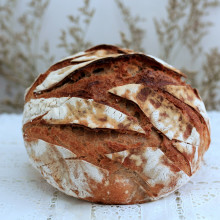Is sourdough bread a healthy option?
Mervyn got in touch to ask "Is sourdough bread a healthy option?" Eva Higginbotham put the question to dietician Rebecca McManamon...
In this episode

00:00 - QotW: Is sourdough bread better for you?
QotW: Is sourdough bread better for you?
This week, Eva Higginbotham’s been slicing up an answer to this question from Mervyn, with the help of dietician Rebecca McManamon...
Mervyn - Is sourdough bread a healthy option?
Eva - Now sourdough bread happens to be my absolute favourite, especially toasted with salted butter - delicious! I put the question to dietician Rebecca McManamon, but first things first, what actually is sourdough?
Rebecca - Sourdough bread is different from regular bread because it hasn't had yeast - dried or fresh yeast - added to it. And instead, the thing that makes it rise is natural or wild yeast, that's living in the air.
Eva - To make sourdough, instead of buying baker’s yeast, you start off with what’s called a ‘sourdough starter’, a mixture of fermented flour and water that’s captured natural yeast from the air. The tasty tanginess of sourdough comes from naturally occurring lactobacilli bacteria, which produces lactic acid. But are there any health benefits alongside those taste benefits?
Rebecca - So it could act as a prebiotic, and it may have a slower release of energy from carbohydrates. So prebiotic means that it acts as a food or a fuel for the beneficial or the good bacteria that live in our gut.
Eva - The bacteria in our gut help us digest our food, so it’s only polite that we feed them things they like too! The prebiotic in sourdough is in the form of fibre that we can’t digest, but the bacteria can and will get nutrients out of it. Sourdough bread made with wholemeal flour has other benefits too.
Rebecca - And wholemeal sourdough bread has a lower glycemic index than white or wholemeal bread, meaning that the blood glucose level rises less after eating sourdough at two hours than with other breads. So it might be part of a helpful tool to manage blood glucose in people with type two diabetes.
Eva - It’s thought that the fermentation process involved in making the rising agent for sourdough changes the structure of the starch in the bread, making us digest it more slowly and so preventing blood sugar spiking. All good news so far, but there are some potential drawbacks:
Rebecca - If you make it at home, the dough could spoil when you're making it. And it's also easier to maybe make a slice of artisan bread that is a bit bigger than one that's already pre-sliced.
Eva - So, what’s the verdict?
Rebecca -So yes, it could be a healthy option, but as always, it's got to be in the context of your portion size and in a diet that's got a mixture of different plant-based sources.
Eva - Hooray! Time for toast. Thanks Rebecca. Next time, we’ll be answering this question from Paul
Paul - I was wondering if it was possible to get DNA out of crematorium ashes. Could you get any information about the person such as weight or height, from their ashes?










Comments
Big fan of your shows, but a
Big fan of your shows, but a bit disapointed on this one.
Isn't sourdough bread actually the bread we have been eating for thousands of year? Pasteur identified the yeast we now use only some 120 years ago (Saccharomyces cerevisiae)
It seems to me there is bacteria as well as yeasts in there.
Also I heard about research suggesting it could be better for gluten intolerant people (celiac and others).
which would not be so surprising since this was the daily bread we used for so long.
Would have loved to hear more on this...
Add a comment